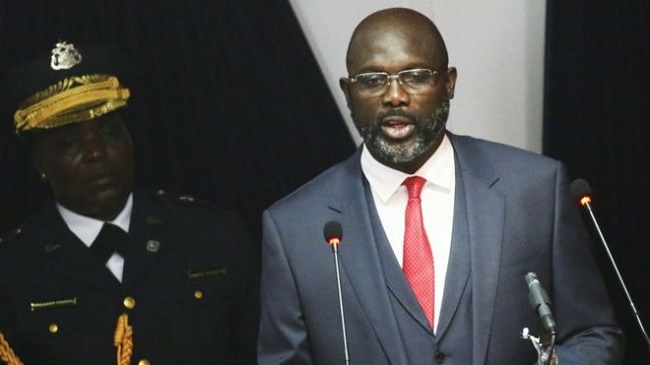George Weah writes: Don’t forget about Liberia

I grew up in the Gibraltar area of Clara Town, a slum in Monrovia, the capital of Liberia. Sport was my passport out of poverty. A combination of luck and hard work enabled me to make my improbable journey from the dusty football fields of Clara Town to glamorous stadiums in Europe. I played professional football for the biggest clubs in the world and was honored to be the first African named FIFA World Player of the Year.
On Jan. 22, I returned to the Samuel Doe football stadium in Monrovia — a beloved venue where I had played numerous games — to take the oath of office as the president of Liberia. It was the nation’s first peaceful, democratic transfer of power in almost 75 years. I stood in the stadium proud and aware of the great responsibility of leading Team Liberia.
Growing up as a poor child, I intimately saw and experienced the hardships an ordinary Liberian faced. I know the difficulties and horrors our people suffered before and during the crippling conflicts that tore Liberia apart from 1989 to 2003. In the mid- and the late ’90s, I often returned home as a good-will ambassador for the United Nations Children’s Fund to help draw attention to my people’s plight and to work to disarm child soldiers.
I moved back to Liberia in 2003. The arrival of peacekeepers the same year, first from our West African neighbors and then from the United Nations, helped end 14 years of successive, brutal civil wars, which killed around 250,000 people and displaced around two million.
Liberia’s people were traumatized, the public sector virtually decimated and the infrastructure reduced to rubble. Through the United Nations, the world offered a hand and we took it. On March 30, the U.N. Mission in Liberia successfully completed its mandate, having helped disarm and rehabilitate combatants and helped families to return home. Liberia’s police and army, which once preyed on the population, began to be professionalized. Over the years, the U.N. mission helped the Liberian government extend state authority and promote human rights.
Liberia held three successful presidential elections, assumed full responsibility for our own security and overcame the horrors of Ebola. We began to repair the torn social fabric of our country. We began to heal and to build. We are grateful for the remarkable work and bravery of the U.N. mission personnel. We honor and remember the sacrifice of the 202 peacekeepers who lost their lives in Liberia.
President Ellen Johnson Sirleaf played an integral role in Liberia’s revival and helped build the foundation on which we stand today. I carry forward the torch from her. I am excited and humbled, ready to get to work.
I must acknowledge the enormous tasks ahead. We need to build a stable and sustainable peace and ensure that our dire socioeconomic situation does not undermine the hard-fought gains of the past 15 years. Liberia’s economy is broken and the government is broke. According to the World Bank, the gross domestic product per capita was $455 in 2016. Inflation is at 15 percent and rising, and unemployment is at record highs. The U.N. human development index ranks Liberia 177 out of 189 countries.
We are determined to move forward. The core of my efforts will be helping the worst off in Liberia. Education will play a central role in pushing the economy forward. We are rebooting our educational system so that everyone can have access to quality education. I am disbursing funds to enable our 12th graders to take the standardized West African Examinations Council examination and attend universities across the region.
The most effective way to improve the lives of the poor and reduce inequality is to ensure that government officials do not skim public resources. I intend to use legislation and build upon our current code of conduct to limit conflicts of interest involving government employees, enhance transparency over public processes and punish violators.
We are also drafting legislation to make our ministries more effective and efficient in addressing the specific challenges they face. We are decentralizing the government to make it more accessible to the people. We are reforming our land rights regulations to ensure equity for all Liberians. We are investing in infrastructure and roads to improve connectivity across the country and promoting agriculture to ensure self-sufficiency and nutrition for all.
To sustain a peaceful and stable Liberia, we are examining ways to strengthen national integration by enacting laws promoting national unification. We are working on reforming our judicial system to ensure the basic rights of all citizens are protected.
It will require sustained engagement from both my government and the citizens of the country. We do need the assistance of our friends outside Liberia. Building a stable, prosperous, democratic Liberia in the heart of West Africa is firmly in the interests of all nations, including the United States.
To ensure economic growth and make Liberia attractive for investment, I have committed to removing unnecessary regulations and bureaucratic hurdles. We need urgent reforms in a number of areas, including removal of restrictions on dual citizenship and regulations that limit land ownership to Liberian citizens. Liberia is open for business and my government will take every measure to support economic growth and bring prosperity to all our people.
But we do need continued support from our international partners. Don’t forget Liberia as we move from recovery to development. We are not asking for charity; we are looking for a chance. We need partners to walk with us on the road to progress and development.
George Weah is the President of Liberia
This article was first published by the New York Times

